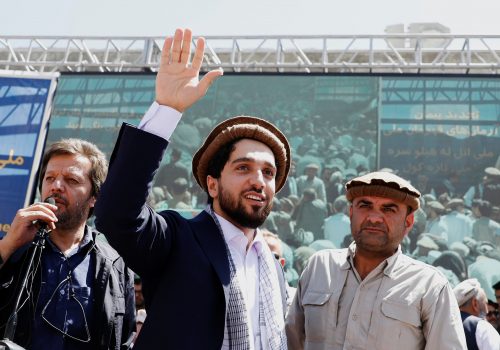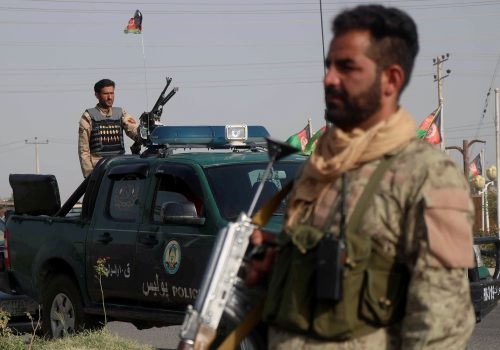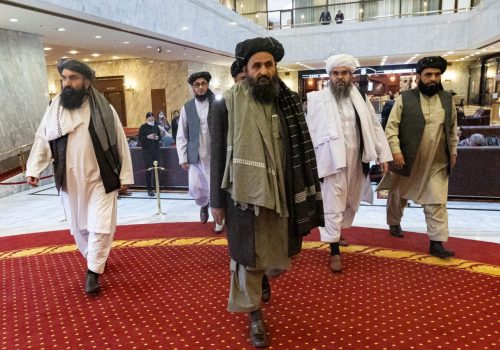Three paths for counterterrorism after the Afghanistan withdrawal
The US military intervention in Afghanistan began in the crucible of terrorism. Twenty years later, as US forces withdraw from the country and the Taliban go on the offensive, it is yet again terrorism—or a lack thereof—that could determine how President Joe Biden’s Afghanistan policy is remembered.
The threat that the Taliban now poses to the Afghan people is dire. But Americans also have a vital interest here in addition to the grave humanitarian concerns. Peering into the future in Afghanistan, there are only three possible scenarios from a counterterrorism perspective: (1) the terrorist organizations in Afghanistan will no longer seek to conduct external attacks against Americans or vital US interests; (2) the terrorist organizations will still seek to conduct such external attacks, but the Taliban will prevent them from doing so, or at least against Americans; (3) the terrorist organizations will eventually conduct such external attacks.
The burden of proof lies with those who might argue that the first scenario will emerge, since thus far Salafi-jihadist groups have an impressively consistent track record of seeking external attacks after achieving sanctuary. The second scenario appears perfectly logical from an American perspective, since it requires only that the Taliban act in what we see as their own self-interest. Alas, our decades of experience with the Taliban strongly suggest that our views of the Taliban’s interests often don’t match their actual interests. Moreover, the scenario both overstates likely Taliban capabilities and discounts the extent of the interdependence between al-Qaeda (but not the Islamic State) and the Taliban. So while some in Washington might hope that the second scenario emerges, it is an extremely risky bet to make.
Thus we are left with the third scenario: that eventually Afghanistan-based terrorist organizations will conduct external attacks against Americans, unimpeded by the Taliban. It is still uncertain how long it might take for this scenario to develop. But at this point, it is the most likely of the three.
The ability of US forces to deter such attacks will rely heavily on conditions on the ground, which are deteriorating by the day. The Afghan National Defense and Security Forces (ANDSF) appear incapable of defending the entire countryside or major population centers from the Taliban, but they are potentially capable of defending Kabul. That alone would be an important accomplishment, as it would allow the legitimate government to continue to exist, retain international recognition, sustain the armed forces as a coherent entity, keep Hamid Karzai International Airport open, and preserve the country’s banking and communications systems. It would also allow foreign embassies to stay in Afghanistan and remain largely operational. The United States would be able to retain a sharply limited but still critical local presence to protect its continuing counterterrorism objectives.
The odds that the ANDSF succeed in defending the capital would significantly improve if US special operations forces could continue to provide Afghan forces with advice and assistance through a traditional foreign internal defense mission operated out of the US embassy. Unfortunately, the United States has thus far pointedly declined to declare defending Kabul as a specific objective in its withdrawal. This absence is most immediately felt by the people on the ground in Afghanistan, who are logically looking to hedge their bets in case of a complete collapse—which, in turn, propels momentum toward that very collapse. This psychological dynamic is as old as warfare itself.
During the first year of the previous administration, I wrote that “Donald J. Trump became the third consecutive US president to ensure that his successor will also need to wage war in Afghanistan.” Biden understandably seeks to break this pattern after twenty years of fighting and thus ordered the withdrawal of US forces capable of conducting direct action. This decision carries risks but is justifiable given the current circumstances and the balance of US interests globally. However, I also wrote four years ago that “if organizations such as al-Qaeda and the Islamic State were to magically disappear from Afghanistan tomorrow, the United States would have no vital national-security interests there at all.” Sadly, the local terrorist organizations have not yet disappeared; thus, it is unfortunate that the United States is also withdrawing most of the US forces capable of organizing partner counterterrorism units through indirect action.
An “over-the-horizon” American counterterrorism campaign, as Biden calls it, will have only limited effect in the best circumstances (perhaps a sharp decline in actionable intelligence, an increase in the time it takes to deploy air assets, etc.) and be especially ineffective if the Taliban takes Kabul and the United States is forced to withdraw its embassy entirely. That was the context for US counterterrorism operations in Afghanistan in the 1990s, and the operations failed to prevent 9/11. In the absence of an effective, continued US or Afghan counterterrorism campaign, local Salafi-jihadist organizations are highly likely to reestablish a physical sanctuary within Afghanistan from which they will believe they can act with an acceptable degree of impunity.
To his credit, Biden has appointed a number of serious and experienced counterterrorism professionals who are now at the helm of the large, integrated, and multi-agency US counterterrorism machine that consecutive administrations have built in the twenty years since 9/11. There’s hope that this machine will successfully disrupt attacks far from US shores and work with other countries to protect Americans abroad. If an attack originating from Afghanistan manages to get through US defenses and across its borders, the hope is that the domestic counterterrorism elements of the machine will foil the plot entirely or limit its damage. It is on this basis—whether the machine triumphs—that the ultimate success or failure of the Biden administration’s policy toward Afghanistan should be judged.
William F. Wechsler is director of the Rafik Hariri Center and Middle East Programs at the Atlantic Council. He worked on counterterrorism policies toward Afghanistan both in the Obama administration—as the deputy assistant secretary of defense for special operations and combatting terrorism, and as the deputy assistant secretary of defense for counternarcotics and global threats—and in the Clinton administration, as director for transnational threats on the National Security Council staff.
Further reading
Image: FILE PHOTO: Former Mujahideen hold weapons to support Afghan forces in their fight against Taliban, on the outskirts of Herat province, Afghanistan July 10, 2021. REUTERS/Jalil Ahmad/File Photo


